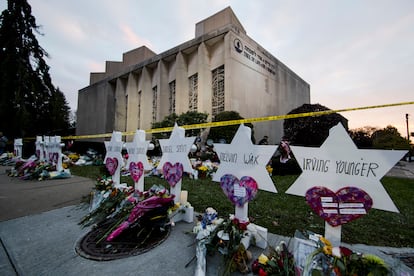Jurors weighing fate of Pittsburgh synagogue killer hear of the devastation he left behind
Gunman Robert Bowers, lawyers argued Monday that life in prison would be sufficient punishment for the nation’s deadliest antisemitic attack, for which prosecutors seek the death penalty

The gunman who killed 11 worshippers at a Pittsburgh synagogue targeted them because of their faith and has never once expressed remorse, a federal prosecutor said Monday in asking jurors to impose a death sentence. The defense argued that life in prison is sufficient punishment for the nation’s deadliest antisemitic attack.
Opening statements Monday in the sentencing phase of Robert Bowers’ federal trial painted dueling portraits of the man who opened fire during religious services in the heart of Pittsburgh’s Jewish community: That of an unrepentant killer motivated by his hated of Jews, and of a psychologically damaged loner with a terrible childhood who fell under the influence of online extremists.
Bowers, 50, a truck driver from suburban Baldwin, killed members of three congregations who had gathered at the Tree of Life synagogue on Oct. 27, 2018. He also wounded two worshippers and five police officers.
After returning a conviction on all 63 counts he faced, jurors subsequently determined Bowers’ crimes are eligible for capital punishment, moving the trial into its final stretch — a decision on his sentence.
Prosecutors began presenting victim impact testimony to bolster their case for death. Survivor Carol Black, who testified earlier in the trial, returned to the witness stand Monday to tell jurors about her beloved brother, 65-year-old Richard Gottfried, a dentist who was shot and killed.
Gottfried was “warm and loving” and a “good friend,” Black recalled. The siblings were close, attending University of Pittsburgh football games together for decades. He was active at the synagogue and would often lead the family in prayer during religious holidays, Black said.
“It’s just such a huge void in our family, for him not to be here,” she said.
Gottfriend’s wife, Margaret “Peg” Durachko, testified about how they offered free dental care to those in need, and about how their Jewish and Roman Catholic faith traditions meshed.
The couple had expected to have 30 more years together, she said.
“My whole world was turned upside down” by his killing, she said. “He was my whole family because we never had children. It was wiped out in a second.”
Earlier Monday, during opening statements, prosecutors reminded the jury about Bowers’ history of spewing antisemitic hatred online. Since then, the killer has boasted about what he did and told psychologists that he wishes he had killed more, said Assistant U.S. Attorney Nicole Vasquez Schmitt.
“He hated Jews and wanted to kill as many as he could,” she said.
Naming each of the 11 deceased victims as their photos were displayed on a screen, the prosecutor said Bowers had inflicted immeasurable pain and suffering. His decision to target people attending religious services at a place of worship — many of them elderly and disabled — made the attack that much worse, she said.
“These were not victims who could run away or fight back. They were easy prey,” said Vasquez Schmitt, telling jurors they would hear testimony about their lives and how much they are loved and missed.
She asked the jury to hold Bowers accountable, calling the death penalty a “verdict of justice.”
The defense, in its opening statement, focused on Bowers’ difficult childhood. Bowers’ parents divorced when he was a baby, his father took his own life after being charged with rape, and his mother later told Bowers she wished he had never been born, said public defender Elisa Long.
Bowers was “hungry and cold” throughout much of his early life and was “profoundly shaped” by childhood trauma, Long said. Later, as an adult, he was a loner with few friends, she said.
The defense argued that mental illness and brain abnormalities made Bowers more susceptible to being influenced by the extremist content he found online.
“We ask each of you at the end of this process to look deep in your heart and conclude enough is enough,” Long told the jury. “Another death will not make things right.”
Also killed in the attack were Joyce Fienberg, 75; Rose Mallinger, 97; Dr. Jerry Rabinowitz, 66; brothers David Rosenthal, 54, and Cecil Rosenthal, 59; Bernice Simon, 84, and her husband, Sylvan Simon, 86; Dan Stein, 71; Melvin Wax, 87; and Irving Younger, 69.
Sign up for our weekly newsletter to get more English-language news coverage from EL PAÍS USA Edition
Tu suscripción se está usando en otro dispositivo
¿Quieres añadir otro usuario a tu suscripción?
Si continúas leyendo en este dispositivo, no se podrá leer en el otro.
FlechaTu suscripción se está usando en otro dispositivo y solo puedes acceder a EL PAÍS desde un dispositivo a la vez.
Si quieres compartir tu cuenta, cambia tu suscripción a la modalidad Premium, así podrás añadir otro usuario. Cada uno accederá con su propia cuenta de email, lo que os permitirá personalizar vuestra experiencia en EL PAÍS.
¿Tienes una suscripción de empresa? Accede aquí para contratar más cuentas.
En el caso de no saber quién está usando tu cuenta, te recomendamos cambiar tu contraseña aquí.
Si decides continuar compartiendo tu cuenta, este mensaje se mostrará en tu dispositivo y en el de la otra persona que está usando tu cuenta de forma indefinida, afectando a tu experiencia de lectura. Puedes consultar aquí los términos y condiciones de la suscripción digital.








































